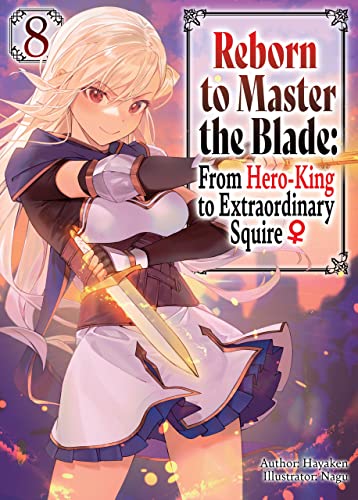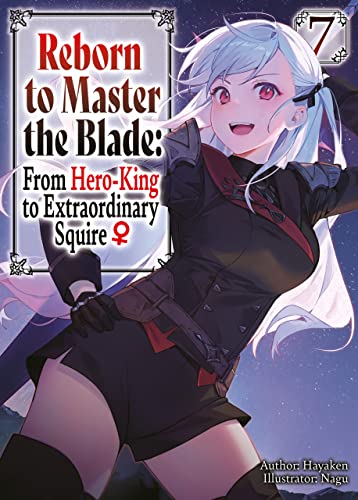By Hayaken and Nagu. Released in Japan as “Eiyu-oh, Bu wo Kiwameru tame Tensei su. Soshite, Sekai Saikyou no Minarai Kisi ♀” by HJ Bunko. Released in North America by J-Novel Club. Translated by Mike Langwiser.
Reborn to Master the Blade is not, I think, a series that’s really trying to do much beyond having fun and writing a lot of Inglis fighting. The author admits in the afterword that they really don’t have much of an idea of where to go next, so there’s not really an end goal in mind. Sometimes this is a good thing. We’re here to see Inglis fight things, and the back half of this book is all that, showing us Inglis coming as close as she’s ever come to actually getting killed, and actually (gasp!) needing the help of other people once or twice in order to fend off the biggest Prismer yet. On the down side, Inglis does not show up until 100 pages into this book, and as I said last time, without Inglis this book is just spinning its wheels. I’m sorry, supporting cast, you are not quite interesting enough on your own.
The front half of the book features Lahti facing off against his brother, Windsel, with the winner likely becoming the next King. Windsel has several demands, which seem at least vaguely acceptable, but the last one, “let us execute Pullum”, is a no go, so they’ve got to do battle. This allows everyone to whip out their new special moves, which range from unsurprising (Leone, Liselotte) to very surprising (Lahti). After this, we cut back to the Prismer, and though Rafael, Rafinha and Yua try their best, it’s going to come down to Inglis in the end, when she eventually gets there, which is (of course) right when all hope is lost. That said, can she really have enough power to stop it? And, more importantly, can everyone stop her trying to heal it up so that she can fight it even more equally?
This is essentially a series written for guys, but it features a whole lot of kickass women with either swords, magic, or both. As a result, it tries hard to attempt to push back on “why are women fighting, they are too fragile, the man should be protecting them” and actually embracing that, mostly because “a guy has to protect his younger sister” is a stronger cliche than “women can fight as well as men” in the author’s mind. It’s a bit disappointed, but hey, at least Leon and Leone have worked things out. I was also rather surprised, contrary to what I’d guessed in the last review, that the “turned into a magicite beast” process does NOT appear to be reversible. That said, Yua was at least polite enough to rescue the only one we’d actually seen named, and hopefully they can at least do SOMETHING for him.
After a half-volume of fighting, the epilogue features a whole lot of eating. This is definitely an “end of arc” book, and the next one promises to be far more light-hearted. That said, it also promises fewer fights. I hope I’m wrong there.



